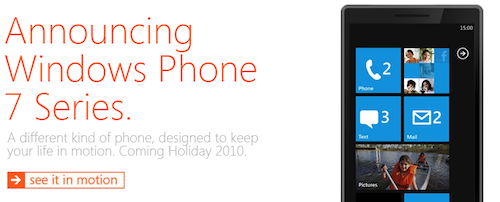
After seeing Microsoft's announcement of Windows Phone 7 Series, I'll readily admit that the concept excites me. While I haven't experimented with it in person and thus can't provide an accurate depiction of what it does and doesn't do, my excitement doesn't come from the OS alone. Oddly enough, it comes from Microsoft's realization that complete innovation was the only option for long-term success. Let's be clear: the fact that Microsoft has completely redefined their mobile OS from the ground up is a huge step for a company that is notorious for reproducing similar products over and over again. It shows that they're ready to play again.
There are a number of similarities between Windows Mobile and PalmOS, Palm's legacy offering. Much like PalmOS, Windows Mobile was an establishment of mobile computing for many years. Much like PalmOS, it was kept around for years with minimal updates here and there. Let's be honest - the strategy worked until the launch of the iPhone. Fast forward a few years, and a whirlwind of mobile OSes entered the playing field and challenged Windows Mobile in every manner. From web browsing, to messaging, to listening to music, alternative operating systems existed on the market that made even the most die-hard Windows fans ponder "why Microsoft?" Needless to say, when you get to that point, nothing good can come out of it.
On that note, when you look at Windows Phone 7 Series, be sure to look at it objectively and remove Windows Mobile out of your vocabulary, as it doesn't exist anymore. This isn't the Windows Mobile that you and I remember from the mid-2000's. Windows Phone 7 Series has been rebuilt from the ground up, and is a clear indicator that Microsoft realized the need to innovate in today's smartphone market. The convergence of wireless and computing are rapidly merging, and Microsoft is positioned for success with its new mobile operating system. The true question is whether the company will harness it to the extent that they should.
At the end of the day, it doesn't matter if Windows Phone 7 Series makes coffee, tea, toast, and bagels better than Android, iPhone, or webOS. If Microsoft really wants market share, the winning formula for success is usability for the average consumer. If 7 Series is too complicated, or requires too much time and energy to perform basic day-to-day tasks, then it won't succeed in the long-term. At one point, there was a demographic that would overlook this (IT specialists, businesses, and tech-centric consumers), but after seeing how easy and painless a smartphone can perform (iPhone), ease of use is now an expectation. We're dealing with the consumerization of the smartphone - Mom, Dad, Grandma, the FedEx guy, and your 12-year-old neighbor all have one, and Microsoft's strategies of the past aren't going to work in today's market. If I could communicate anything to Microsoft, it would be this:
Microsoft, you have a notorious reputation for offering a complicated mobile operating system, yet you dominate the PC operating system field. Your latest version of Windows (7) has received quite a bit of praise from supporters and critics alike for its numerous improvements over past versions. In order to make Windows Phone 7 Series successful, you need to leverage your brand name, create an ecosystem between Windows 7 and Windows Phone 7 Series that rivals Apple, and take the opportunity to revamp your platform into something usable for everyone. It's your one opportunity to catapult yourself back into the smartphone races, so make your decisions wisely.
At best, you have to agree that Windows Phone 7 Series is a revolutionary entry into the smartphone OS field, and at worst, you have to acknowledge that the new operating system is a valiant effort by the company to increase their market share in a crowded arena. The remaining element to the success of 7 Series is execution. Microsoft, make 7 your lucky number.